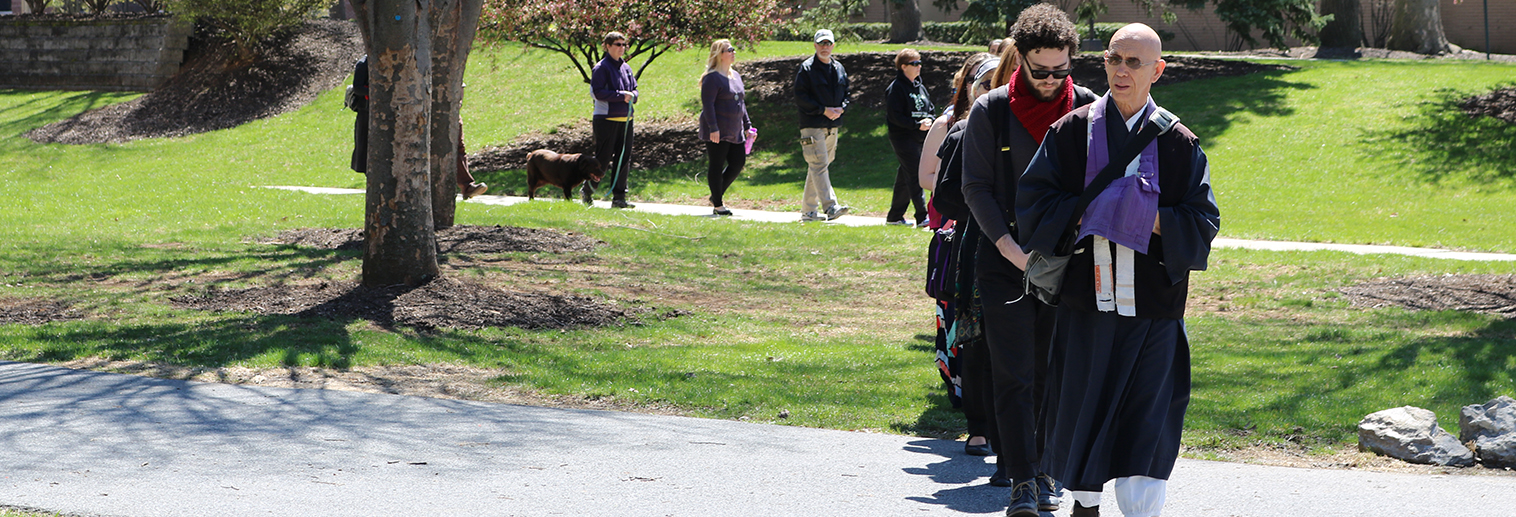Zen Master Visits Campus
By Michael Mellet ‘16
This year marked the arrival of Moravian University’s 9th Peace and Justice Scholar in Residence, Claude AnShin Thomas, a Zen Buddhist Monk and veteran of the Vietnam War. But for me, it was more than merely an opportunity to learn from a Zen Masters. Rather, it was a very personal experience that brought me back several years.
I first met Claude AnShin in 2010 when he stayed in my home. We were hosting him there during his visit to a VA Hospital in New York. Only 15 years old then, I remember being both perplexed and intrigued by this man’s presence. I recall sitting at our kitchen table across from him. Words were exchanged, no doubt, but they are not what has stuck with me. Rather, I recall most vividly the way Claude AnShin made me feel as we sat in contemplative silence. Each smile, glance, and second of silence felt like a friendly invitation to be with him in that moment at that table. I was mostly unsure of what to do with that invitation. All I knew is that something about this man’s presence required that I experience myself in a way I hadn’t before and did not know was possible. It made me squeamish, unsure of myself, nervous.
The struggle of that experience now strikes me with a sharp poignancy, the gravity of which I have only just begun to appreciate. I am struck, not because I am moved by how far I’ve come, or by how much I’ve learned, but because it is a struggle that remains central in my life: that of being at peace with my un-peacefulness.
In his memoir, Claude AnShin tells us: “The way to healing is through our suffering—looking deeply at the nature of ourselves, talking freely about how we feel, creating a language of feelings and using it to begin to break the silence that is so necessary to protect and sustain cycles of aggression." He adds: “We have the ability to pierce the darkness of denial: our society’s and our own. We have to talk. We must talk.”
These words swam through my mind as several staff members, faculty—most notably Dr. Denton-Borhaug--and I, sat together planning what would be Claude AnShin’s week-long stay at the college. We scheduled a whole array of events from a public talk to in-class visits to walking and eating meditation practice. I’m not exactly sure what I expected to happen at all of these events. I was even less sure about what effect Claude would have on my fellow students, as well as the faculty and staff members with whom he would cross paths. I am sure, however, of how pleasantly surprised I was.
Like my early experiences with Claude, he challenged students and professors alike wherever he went. These challenges were never violent or abrasive, but they were incongruous with expectations: Why am I being asked about my feelings, my thoughts? What is my relationship to these things? Why is that man wearing a dress?
His outfit was especially jarring for many, I’m sure! Indeed, Claude’s presence asks of those with whom he interacts that they be fully present not only with him but especially with themselves. Seldom are we asked to be self-reflective; to engage in self-understanding. One may argue that knowing oneself so intimately and authentically has become a form of dissonance in our culture. Thus, as Claude engaged the campus in these various venues and styles, some inevitably felt challenged. The beauty in these challenges is each individual’s ability to engage in these challenges for the sake of growth and understanding.
Each day that Claude spent on campus I came in contact with both students and faculty who were grateful to have met him, some who were unsure, and others still who were put off or felt intruded upon. Such is the beauty of the human experience: a disparate array of realities, each of them meshing and interacting continuously. Not everyone who met Claude was prepared to be challenged and to reflect. Indeed, meditative practice is not meant to be easy, although it may seem simple. No matter the effect, I was excited to hear that Claude had touched the lives of so many in some way. We began an imperative discussion on Moravian’s campus—one that seeks to find healing through suffering that utilizes a language of feelings and, most importantly, that has broken the silence. Now it is up to each of us to keep talking, keep feeling, and keep seeking to understand not only ourselves but all others as well.

